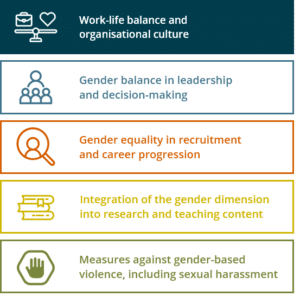Nehem is an important service provider in the field of Diversity, Equity and Inclusion (DEI). Our DEI experts are committed to contribute to SDG 5, and have the knowledge and tools to support organisations in the creation of a gender equal work environment where talent can thrive.
Gender equality is a broad and multi-faceted concept. The European Commission recommends a division into five thematic areas for gender equality in research & innovation. In a series of five articles, we will introduce you to these thematic areas, which we like to call Key Areas of Intervention (KAIs). This article will focus on KAI 1: ‘Work-life balance and organisational culture’.

“We all have different roles in our life; we are fathers, sons, breadwinners, husbands, wives, mothers, CEOs, bosses and members of social clubs. Imbalance is created when we perform well in one or more of these roles at the sacrifice of some other equally important roles.”
(Anwar, 2013)
A key component in advancing gender equality is achieving work-life balance. A perfect work-lifebalance would symbolise a state where a person is able to equally prioritise these different roles intheir professional and personal lives, and when this is accepted and stimulated in both organisations and society at large. A good work-life balance has positive effects: it not only improves mental and physical well-being, it also improves work productivity and increases job satisfaction. Having a strong work-life balance is therefore essential in preventing unhealthy lifestyles, reducing stress and creating a positive work environment.
However, people are now working longer hours and the boundaries between professional and personal lives are slowly disappearing. With recent technological advances, the ability to work from home is readily available and employees are in constant contact with the workplace. Due to COVID-19, this hybrid way of working has become the norm, further amplifying the challenge to create a strong work-life balance.
According to EIGE, improving work-life balance for your employees involves “ensuring that everybody is properly supported to advance their career alongside personal responsibilities that they may hold outside the workplace, including caring responsibilities” (2021). Organisations are increasingly stimulated to implement work practices intended to facilitate a more harmonious work-life balance for their employees, including flexible working arrangements, childcare services, parental leave policies or informal care infrastructures. Accordingly, work-life balance and organisational culture are closely related. Research has shown that work-life balance is created through a strong organisational support system, which develops through organisational culture (Rife & Hall, 2015). An organisational culture is a collection of values, expectations and practices, both spoken and unspoken, that guide and inform the actions of all employees, and is extremely important for the success of the organisation. Culture is often initially determined by the leadership style of directors and develops overtime when the organisation is growing and people come and go. An organisational culture additionally determines whether employees can and will take advantage of the available practices facilitating work-life balance. Managers are an important factor in creating a culture where a positive work environment, healthy lifestyles and work-life balance are accepted and stimulated. For example, leadership could ask their employees to work long days and weekends or they could encourage them to minimize overwork and go home at the end of the day.
Although women are an increasingly large part of the workforce, they are still doing the majority of household tasks. Therefore, it is not strange that literature shows that working women experience more challenges in work-life balance compared to men (Sundaresan, 2014). Despite this fact, it is important to note that a healthy work-life balance and continuous organisational support is important to the whole organisation, as everyone benefits from an open, respectful organisational culture with a diverse workforce.
Improving the organisational culture and stimulating a good work-life balance will empower organisations to keep employees motivated and perform well; to position themselves as a sought-after employer, attracting and retaining the best talent; and to increase their corporate social responsibility (Lazar et al, 2010). We can conclude that providing opportunities to harmonise personal and work lives has become an important ingredient for organisational success.
Anwar, S. (2013). Work-life balance: Reflections and interventions. Timelenders.
EIGE (2021). Work-life balance and organisational culture | European Institute for Gender Equality.
Rife, A.A., & Hall, R.J. (2015). Work-life balance. Society for Industrial and Organizational Psychology.
Sundaresan, S. (2014). Work-life balance: Implications for working women. OIDA International
Journal of Sustainable Development, 7(7).
Lazar, I., Osoian, C. & Ratiu, P. (2010). The role of work-life balance practices in order to improve
organizational performance. European Research Studies Journal, XIII(1).
Read more about Diversity, Equity and Inclusion
MDIEU-subsidie: allerlaatste aanvraagronde in 2024
Uw personeel gezond werkend zijn pensioen laten halen; dat wil toch elke werkgever? Toch lukt dat niet altijd, bijvoorbeeld door fysieke of psychische klachten van medewerkers. De MDIEU-subsidie helpt werkgevers om medewerkers ‘duurzaam inzetbaar’ te houden. Plannen...
De SLIM subsidie voor samenwerkingsverbanden opent in juni
Het doel van de SLIM-regeling is het vergroten van het aantal mkb’s dat een ‘Leven Lang Ontwikkelen’ van werknemers in de onderneming mogelijk maakt. Dit betekent dat er in de onderneming aandacht is voor de ontwikkeling van het bedrijf én van de medewerkers....
KIEM, focus op Impact
Praktijkgericht onderzoek is cruciaal voor de aanpak van de grote maatschappelijke vraagstukken van deze tijd. Het draagt door zijn aard – vraaggestuurd, transdisciplinair, cross-sectoraal en inclusief – bij aan nieuwe en bruikbare oplossingen. Het creëert daarmee...


